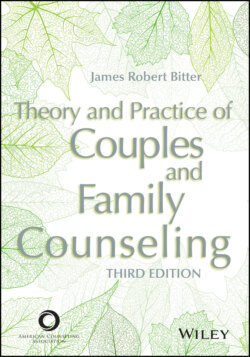Читать книгу Theory and Practice of Couples and Family Counseling - James Robert Bitter - Страница 56
Harlene Anderson, Harold Goolishian, and Karl Tomm
ОглавлениеTo offset the inherent power imbalance of psychotherapy, Harlene Anderson and Harold Goolishian (1992) adopted what they called a not-knowing position in counseling, a stance with clients characterized by interest, fascination, curiosity, and exploration. Their focus on asking the next most interesting question kept the conversation in a position to evolve into new stories. Anderson and Goolishian worked out of Houston Galveston Institute starting in the 1990s. Harold Goolishian died in 1991. Harlene Anderson (1997) continues to develop her conversational, collaborative, postmodern approach to counseling.
Anderson and Goolishian were also a huge influence on the later work of Lynn Hoffman and Peggy Papp at the Ackerman Institute and in Hoffman’s home base in Massachusetts. Like many postmodernists, their work evolved from the prominent strategic model into the more human conversations of meaning. Hoffman and Papp also adopted the reflecting team approach of Tom Andersen (1991), a process that developed when Andersen, working in Norway, brought his cotherapists out from behind the one-way mirrors that had been used in Milan-style strategic counseling. Andersen found that when therapists talked in the light with the family listening, they used more human terms. The multiple perspectives also conveyed the message that there was not one unitary meaning to life or to approaching life’s challenges. Reflecting teams became a positive force in deconstructing the problem-oriented stories of psychopathology.
The connection of social constructionism and dominant narratives to social justice issues permeates much of what is now called narrative therapy. One of the key spokespersons for the causes of social justice is Karl Tomm (1998). Like many family practitioners working in the 1980s, his positions evolved from an MRI-based strategic model into a more story-based stance that embraced and attempted to address many of the criticisms that came from feminists.
